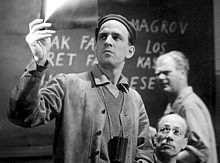Gatekeepers of open source innovation


How do we build innovation into open source? (The picture is from Wikipedia. Guess who it is, then click to get the full post.)
Taking his title from Eric Raymond's book, Matt suggests that the proprietary model may be the best way to go here, and suggests that open core licensing, credited to JasperSoft's Andrew Lampitt, may be the best route forward.
The problem is that innovation demands a committed team, and an ample incentive. By making the core of a product open source, then offering the secret sauce as a proprietary addition, companies can bring in the cash needed to create such teams.
There is little doubt that many in this community are wondering where the open source innovation is coming from. Every new rumor of Firefox code is seized upon by readers anxious to find some innovation in the open source mass market.
One reason for this may be that the Firefox team has both financial commitment and incentive. The best communities are built around projects with those attributes.
But there are many other areas of open source where both attributes exist. There is enormous incentive in the mobile device market, where you can get paid for hardware with open source software embedded in it.
So why are Android and Moblin still serving us leftover Apple slices?
One reason might be that invention -- pure invention -- remains a solitary pursuit. Movies still depend on writers and even when the movie is being made we know the director is in charge. Innovation, in a group setting, demands an innovative gatekeeper.
So there's another ingredient to be mixed into the innovation stew. We need a motivated team, with adequate incentives, but we also need an innovative gatekeeper whose vision rides herd on everyone else.
This is the key to Linux' success. Linus Torvalds is not an entrepreneur, but a director.
If Steve Jobs is Walt Disney, Torvalds is more like Ingmar Bergman.
How does open source create more Bergmans?